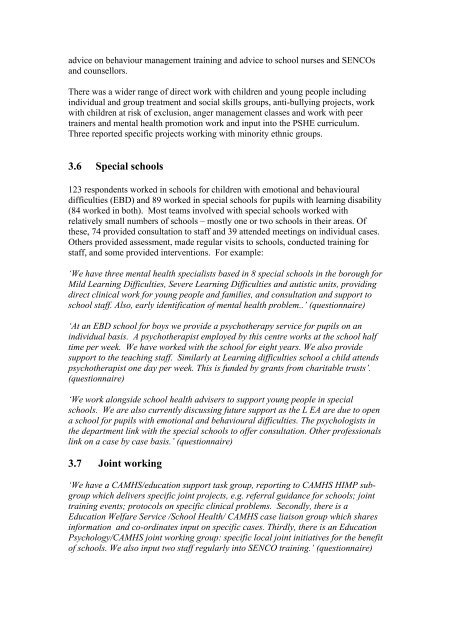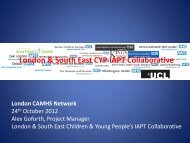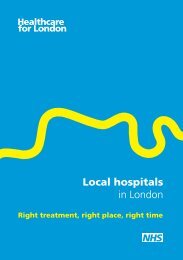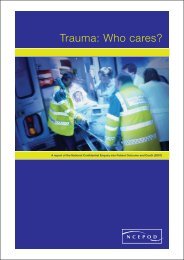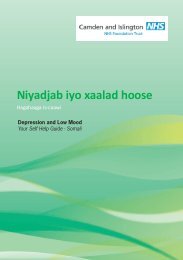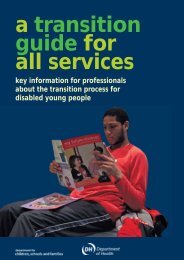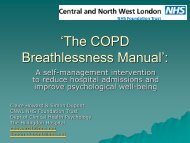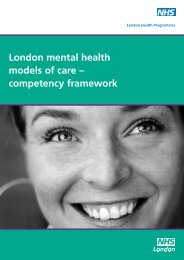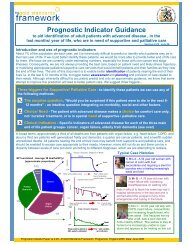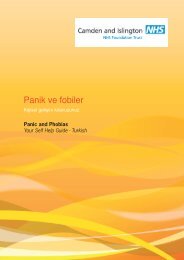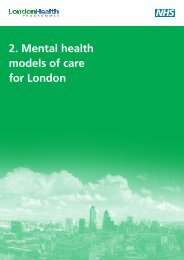(CAMHS) and Schools - London Health Programmes
(CAMHS) and Schools - London Health Programmes
(CAMHS) and Schools - London Health Programmes
Create successful ePaper yourself
Turn your PDF publications into a flip-book with our unique Google optimized e-Paper software.
advice on behaviour management training <strong>and</strong> advice to school nurses <strong>and</strong> SENCOs<br />
<strong>and</strong> counsellors.<br />
There was a wider range of direct work with children <strong>and</strong> young people including<br />
individual <strong>and</strong> group treatment <strong>and</strong> social skills groups, anti-bullying projects, work<br />
with children at risk of exclusion, anger management classes <strong>and</strong> work with peer<br />
trainers <strong>and</strong> mental health promotion work <strong>and</strong> input into the PSHE curriculum.<br />
Three reported specific projects working with minority ethnic groups.<br />
3.6 Special schools<br />
123 respondents worked in schools for children with emotional <strong>and</strong> behavioural<br />
difficulties (EBD) <strong>and</strong> 89 worked in special schools for pupils with learning disability<br />
(84 worked in both). Most teams involved with special schools worked with<br />
relatively small numbers of schools – mostly one or two schools in their areas. Of<br />
these, 74 provided consultation to staff <strong>and</strong> 39 attended meetings on individual cases.<br />
Others provided assessment, made regular visits to schools, conducted training for<br />
staff, <strong>and</strong> some provided interventions. For example:<br />
‘We have three mental health specialists based in 8 special schools in the borough for<br />
Mild Learning Difficulties, Severe Learning Difficulties <strong>and</strong> autistic units, providing<br />
direct clinical work for young people <strong>and</strong> families, <strong>and</strong> consultation <strong>and</strong> support to<br />
school staff. Also, early identification of mental health problem..’ (questionnaire)<br />
‘At an EBD school for boys we provide a psychotherapy service for pupils on an<br />
individual basis. A psychotherapist employed by this centre works at the school half<br />
time per week. We have worked with the school for eight years. We also provide<br />
support to the teaching staff. Similarly at Learning difficulties school a child attends<br />
psychotherapist one day per week. This is funded by grants from charitable trusts’.<br />
(questionnaire)<br />
‘We work alongside school health advisers to support young people in special<br />
schools. We are also currently discussing future support as the L EA are due to open<br />
a school for pupils with emotional <strong>and</strong> behavioural difficulties. The psychologists in<br />
the department link with the special schools to offer consultation. Other professionals<br />
link on a case by case basis.’ (questionnaire)<br />
3.7 Joint working<br />
‘We have a <strong>CAMHS</strong>/education support task group, reporting to <strong>CAMHS</strong> HIMP subgroup<br />
which delivers specific joint projects, e.g. referral guidance for schools; joint<br />
training events; protocols on specific clinical problems. Secondly, there is a<br />
Education Welfare Service /School <strong>Health</strong>/ <strong>CAMHS</strong> case liaison group which shares<br />
information <strong>and</strong> co-ordinates input on specific cases. Thirdly, there is an Education<br />
Psychology/<strong>CAMHS</strong> joint working group: specific local joint initiatives for the benefit<br />
of schools. We also input two staff regularly into SENCO training.’ (questionnaire)


